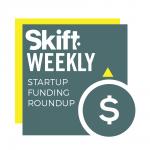Skift Take
As the recovery takes hold in many countries, investors are clocking startups like raptors track mice. Travel startups announced $657 million in funding this week.

Travel Startup Funding This Week
Each week we round up travel startups that have recently received or announced funding. Please email Travel Tech Reporter Justin Dawes at [email protected] if you have funding news.
This week, travel startups announced more than $657 million in funding.
>>FlixMobility, a Munich-based transport startup that runs the FlixBus intercity bus brand and the FlixTrain rail brand, said this week it had raised $650 million in equity and debt financing from investors.
The deal placed a valuation of more than $3 billion on the company. Details, here.
Skift’s profile of FlixMobility from last month, here.
>>Travello, a travel startup that helps like-minded travelers connect and discover tours and activities, has raised $5 million ($6.5 million Australian) in a Series A round of funding.
The Australia-based startup attracted several investors, such as Jim Goldburg, the co-founder of travel agency giant Flight Centre, and Andrew McEvoy, the former boss of Tourism Australia.
The company’s acquisition of tours-and-activities booking service Backpacker Deals in October 2020 played a part in its shift in business models from being a “community with an online travel agency” to “an online travel agency with a community,” said co-founder and CEO Ryan Hanly
The company, which raised about $4 million ($5 million Australian) in 2018, has 1.2 million members of all ages. But it has especially drawn a younger audience that tends to find and discover “things to do” mainly through recommendations from peers rather than sites like TripAdvisor, Hanly said.
>>Beonprice, which provides revenue management services to hoteliers, said it had closed a $2.4 million (€2 million) Series A round of funding.
Adara Ventures, a fund based in Luxembourg, led the round. The Travel Tech fund and CDTI also took part.
The startup, based in Salamanca, Spain, helps hoteliers set ideal room rates and improve their online selling. Managers at more than 2,000 hotels, including properties under the brands Iberostar, Labranda, and Room Mate, are clients.
The company recommends room rates by using artificial intelligence. Its software simulates the thinking of travelers by taking into account a hotel’s prices, its online review scores, and the performance of its local competitors.
Beonprice has raised about $7.2 million (€6 million) since its founding in 2012, said co-founder and CEO Rubén Sánchez.
>>Verteil Technologies, an aggregator in the airline distribution sector, has raised an undisclosed amount of seed investment.
Bluebell Group, a boutique investment, led the round. Angel investors also participated.
Verteil Technologies is part of a wave of travel tech startups seeking to update the way that airlines distribute their tickets, upsells, and other content. It has benefited from airlines choosing to adopt the airline sector’s so-called new distribution capability (NDC) standards for distribution.
Skift recently reported that Verteil was the global launch partner for Emirates’s direct distribution effort. Verteil is a distribution partner for more than 30 airlines, including Lufthansa Group, British Airways, American Airlines, and Singapore Airlines.
The startup is based in Kochi, Kerala, and has an operations office in Tokyo.
Skift Cheat Sheet:
We define a startup as a company formed to test and build a repeatable and scalable business model. Few companies meet that definition. The rare ones that do often attract venture capital. Their funding rounds come in waves.
Seed capital is money used to start a business, often led by angel investors and friends or family.
Series A financing is typically drawn from venture capitalists. The round aims to help a startup’s founders make sure that their product is something that customers truly want to buy.
Series B financing is mainly about venture capitalist firms helping a company grow faster. These fundraising rounds can assist in recruiting skilled workers and developing cost-effective marketing.
Series C financing is ordinarily about helping a company expand, such as through acquisitions. In addition to VCs, hedge funds, investment banks, and private equity firms often participate.
Series D, E and beyond These mainly mature businesses and the funding round may help a company prepare to go public or be acquired. A variety of types of private investors might participate.
The Daily Newsletter
Our daily coverage of the global travel industry. Written by editors and analysts from across Skift’s brands.
Have a confidential tip for Skift? Get in touch
Tags: funding, startups, vcroundup
Photo credit: As the recovery takes hold, FlixMobility, the owner of the FlixBus and FlixTrain brands, has closed a mammoth round of debt and equity funding. FlixMobility
